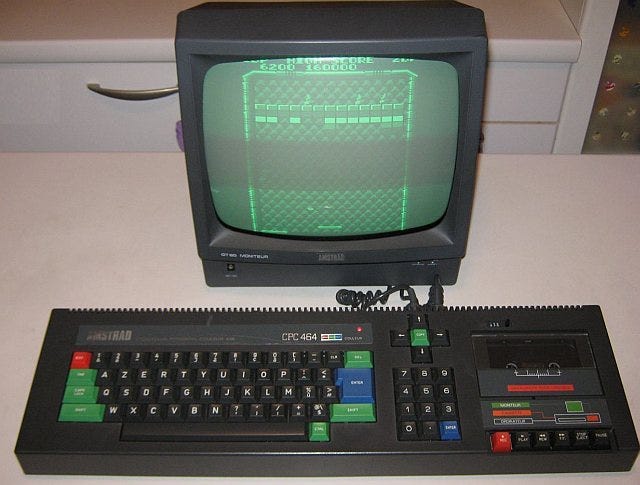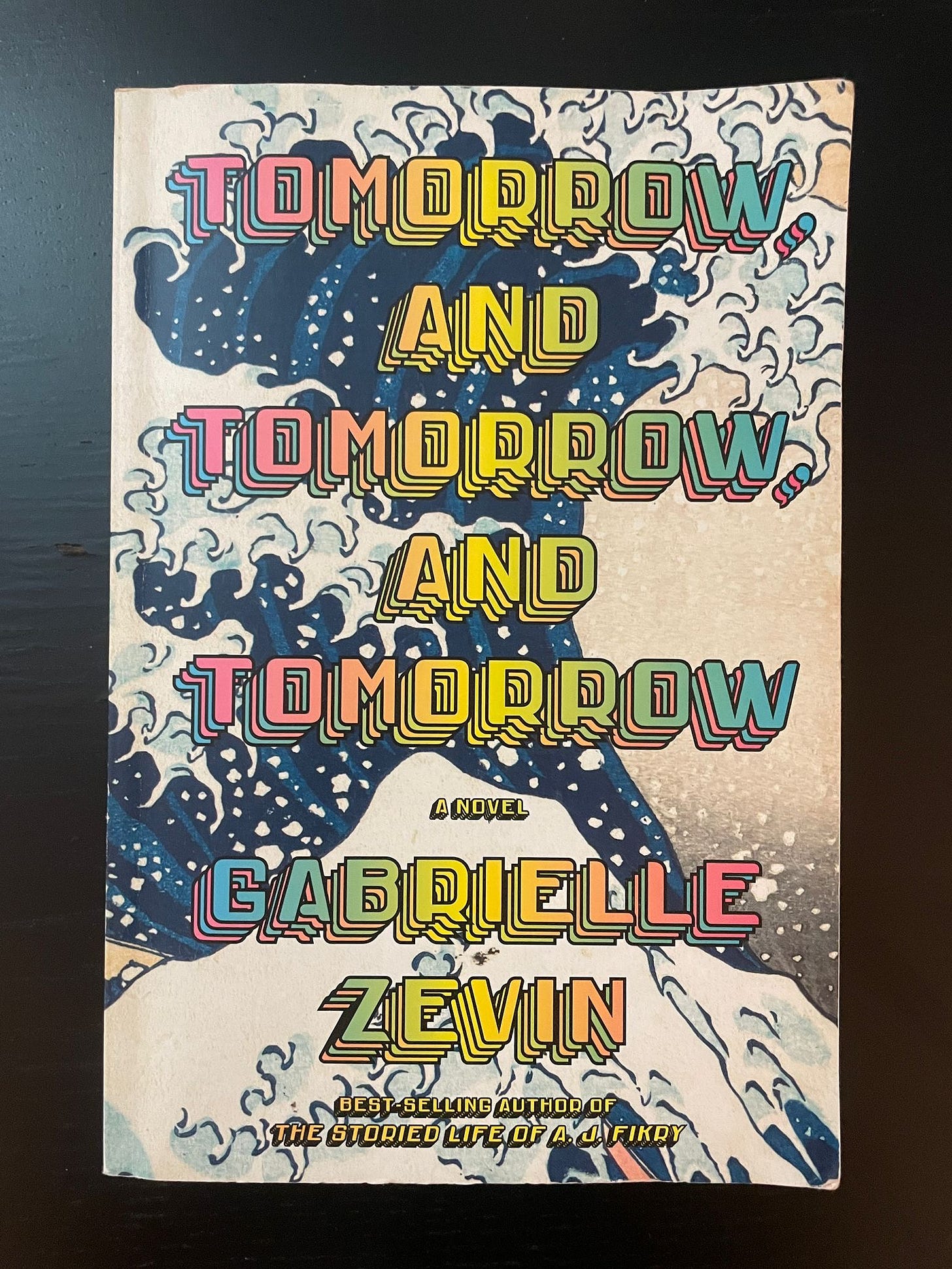Happy Wednesday!
I had some fun with this post as it meant revisiting some of the video games that I played growing up. And it was also a post that seemed to come together fairly easily, at least in my mind, so I hope that you enjoy it too.
I’d love to hear what you think, and please share what you are currently playing. Or if you don’t game, I won’t hold it against you 😉
Sarah xx

I was seven when my parents bought home a new, shiny piece of technology that would blow the young minds of my brother and me – our first desktop computer.
The computer was an Amstrad produced by the now-defunct company of the same name owned by Sir Alan Sugar1 (from The BBC’s, The Apprentice). It was basic by design and function, with a green screen and tap deck, but my brother taught himself to program using the computer, while I generally waited around for what felt like hours while the games loaded.
And although I cannot credit the Amstrad entirely for teaching me an important lesson in patience, it was the start of a lifelong love affair with gaming, and it acted as an introduction into some diverse gaming worlds and storylines that I could get lost in.

My parents upgraded our home computer a few times and if there were any technical issues with a piece of the hardware or if the operating system required an update, my brother, now a master at both programming and electronics was on hand to fix them. At times, he would try to model some of what he was doing, so that I could learn the same skills, but I was more interested in the games themselves – I wanted to learn about how the characters grew within the game’s setting, how the plot and storyline evolved after you completed something crucial (no matter how thin this could be from some of the games I played), and learning what happened after the credits rolled. I am a sucker for cut-scenes, so a bonus extra at the end of a game has always been a winner for me!
Gaming wasn’t something I spoke openly about within my friendship group at school, unless it was with my close male friends, and even then, any discussion of gameplay generally revolved around racing games, think, Gran Turismo and Mario Kart, or classic beat-em-up style games such as Tekken and Street Fighter. And while I enjoyed these games (Mario Kart especially), I was a huge fan of strategy, simulation, and sandbox games where there were either no prescribed goals to meet or they were limited. In these games, you would have a godly-like role as master and maker, where you could create an entire new city and then go about destroying it, if you so wished, or you could build a cool theme park, which would then fall into disrepair if you spent too much money on building the rides but didn’t think about the ticket sales.

That’s not to say that I didn’t like a clear structure or set of goals when playing a game, fantasy games provided a fun, often medieval style twist, where I could create a character (or characters), dress them how I liked, give them a funky name, and then go into battle with goblins and various other monsters. In these games, you were generally tasked in saving the fantasy world from some existential threat, along with saving an NPC (non-playable character, which was usually female), or you would seek revenge for a fallen team-mate.
The world of gaming has come a long way since my early experiences with the Amstrad, but one of the common threads that links the wide range of games that I have enjoyed over the years is that they allowed me to play.
Play is seen as crucial to a child’s psychological development, yet it can feel like it is something that we do less of as we get older. Even the first example used in the Cambridge dictionary definition emphasises play within a child’s context:
Play (verb)
When you play, especially as a child, you spend time doing an enjoyable and/or entertaining activity.
We probably play a lot more as adults than we think, but we may not register whatever the activity is as a form of play. We might have an app on our phones that we log onto while waiting for the bus, hold a board game night with friends, or shout out the answers to the TV when watching a quiz show. And we can also expand and consider other activities, I feel that I can play at the gym when I am involved with certain movements - although this does not apply to using a rower or an aerodyne bike! I realise that this example isn’t for everyone, but this is just to demonstrate that play is whatever you personally take enjoyment from.
And research supports the power of play and the positive effects it can have for adults. Studies have shown that play can improve wellbeing, enhance social connections2, and lead to a state of ‘flow’, where we become absorbed in an activity.
So, the more play we can have in our lives, the better!
I turned 40 earlier this year, and I am still gaming. It feels much like other any activity that can feed my imagination where there’s a great story, while allowing me to have fun. If I can lost in a world through a book, a film, or a game, then I am up for more play-time.
What I am currently playing:
🎮 Zelda - Tears of the Kingdom - vast, lush graphics, references to previous Zelda titles, and a fantastic story. Did I mention that I ❤️ a great storyline?
And a gaming related book:
📖 I managed to get a copy of Tomorrow and Tomorrow and Tomorrow by Gabrielle Zevin from my local library a little while ago and I highly recommend it. Along with a story about friendship and love, I geeked out on the rich compendium-like feel of the games referenced.
Additional source/s:
Thanks for reading!
The Best of Intentions is a newsletter that focuses on a variety of topics from mental health, to the influence of psychology on our lives, to the power of physical activity, and career change in your 40s. And if you liked what’s here, please consider giving the ❤️ a little squeeze, or re-sharing.
Sarah xx
He’s a ‘Baron’ now according to Wikipedia.
This was an interesting qualitative study in particular focusing on adults with serious mental illness.




I loved reading this! I'm 38 and have enjoyed computer games for a long time. My parents were extremely late to the getting a computer party (my mum in particular, seemed to think it was a fad that would go away...ha!) but my best friend had a PC and I used to spend a lot of time at her house playing games like Duke Nukem, Doom and our absolute favourite for whiling away hours - Transport Tycoon! We did eventually get a PC at home and my brother and I played a lot of games.
My husband is really into games and plays a lot and I still dip in and out when I see something that peaks my attention. My most recent favourite is Animal Crossing on Switch which got me through the pandemic!
Funnily enough, I downloaded a new game at the weekend - 'A Highland Song' - because I'd seen a review of it in the Guardian and it sounded up my street. I don't play things very often at the moment, but we're going away next week and will take the switch with us and I plan to lose myself in that game for a bit during our break. I loved 'Strange Horticulture' too which I played a few months back.
I'm rambling now, but I find it so interesting how women don't tend to talk about this very much. I think often gaming gets negative press, but there's so much wonderful, creative storytelling out there and I love to lose myself in that occasionally! Thanks for writing about this!